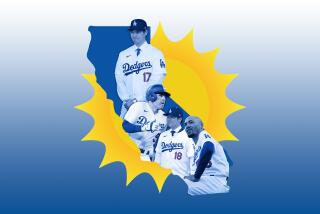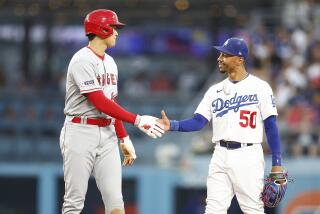Adenhart is on the minds of Angels
His corner locker remained intact -- uniform, spikes, baseballs, glove, equipment bag, water bottle and all. His No. 34 jersey hung in the dugout as it has for every game, home and away. The photo of him in mid-pitching motion was affixed to the center-field wall.
The Angels clinched another American League West championship with an 11-0 victory over the Texas Rangers on Monday night, their fifth division title in six years, and the one player who wasn’t there to live it, to feel it, was the one player who seemed to be everywhere in Angel Stadium.
“There isn’t a guy in this locker room who isn’t playing for his memory,” reliever Jason Bulger said of Nick Adenhart, the 22-year-old Angels pitcher who was killed with two friends when their car was broadsided by an alleged drunk driver near Angel Stadium on April 9, four days into the season.
“We took him onto the field, and not just on the center-field wall,” Bulger said. “He’s in our hearts right now. He’s been a huge part of this season and will continue to be in the postseason.”
On Monday inside the clubhouse, when the Angels celebrated their division title, players talked of Adenhart.
“We lost a dear friend, dear brother, dear teammate, Nick Adenhart,” outfielder Torii Hunter said, as champagne was poured on him. “We had a lot of obstacles, but we came through.”
Angels players then honored Adenhart by running out and touching his photo on the outfield wall.
Throughout the season, the Angels overcame their share of injuries to key players such as Hunter, Vladimir Guerrero, John Lackey, Ervin Santana and Scot Shields.
They weathered the typical ups and downs of a 162-game schedule, those stretches when the offense fell flat, the starting pitchers couldn’t keep the team in the game, or the relievers couldn’t get anyone out.
But how does a team cope with the death of a promising young right-hander who hours before he was killed had thrown six shutout innings against the Oakland Athletics at Angel Stadium?
“It seemed like a dream to me,” pitcher Dustin Moseley said that day.
How does a team that is used to joking around in the clubhouse sit in that same room and listen to Jim Adenhart, his voice cracking with emotion, thank players and coaches for befriending his son just hours after Nick was killed?
“That was one of the toughest things I’ve ever seen,” pitcher Joe Saunders said. “Seeing his dad come in here, someone suffering emotionally like that. As a new father, I could only imagine what he was going through.”
General Manager Tony Reagins fought back tears at a morning news conference as he spoke of the “shock” and “disbelief” the organization felt. Players struggled to comprehend what happened.
Manager Mike Scioscia, though, kept the focus on Jim and Janet Adenhart, Nick’s mother, and not on how Nick’s death would affect the team.
“As tough as what we feel as an organization,” Scioscia said at the time, “it pales in comparison to losing a son.”
The April 9 game against Oakland was postponed. The Angels had to return to the field the next night but they had black, circular patches of Adenhart’s No. 34 sewn on their jerseys, over their hearts.
“There is no template, no instruction manual for dealing with what has happened,” Scioscia said. “But this game has a way of focusing you on the field. One of the easiest things for these guys will be playing the game, going between the lines.”
It seemed that way when the Angels beat the Boston Red Sox, 6-3, with Jered Weaver -- who became so tight with Adenhart that Nick had been set to move into Weaver’s Long Beach house that Sunday -- delivering 6 1/3 brilliant innings.
“It’s a tough thing to swallow,” Weaver said after the game. “It really hasn’t hit me yet.”
It hit the Angels hard over the next few weeks.
They lost nine of 13 games to fall 5 1/2 games out of first place. Their offense struggled. Their bullpen was atrocious.
“Baseball was not important,” Hunter said. “Everyone looked at life a little different, and you could tell. Guys would strike out or get a hit, and you couldn’t tell the difference. It was like, ‘Whatever.’ ”
A turning point came April 23, when the Angels held a private morning memorial service in their stadium for Adenhart. Several players and coaches, as well as Reagins, spoke.
“We had a little closure,” Hunter said. “We realized Nick was a competitor, and he would want us to win. We started getting better, and now look at us. We carry his jersey wherever we go, we kept his locker intact. We never forgot him. We just chose to play with him.”
The night of the service, the Angels beat the Detroit Tigers, 10-5, to begin a stretch in which they went 13-6.
They reeled off 13 wins in 16 games from June 12 to 29 to surge into first place, beginning a remarkable 3 1/2 -month run in which they went 62-34 and distanced themselves from the rest of the AL West.
An offense that sputtered through April and May caught fire in June, surging to the top of the league in batting average, hits and runs behind veterans such as Hunter and Bobby Abreu and breakout years from youngsters such as Kendry Morales and Erick Aybar.
A rotation racked by injuries and Adenhart’s death -- the Angels have used 14 starters this season -- jelled in late August with the acquisition of left-hander Scott Kazmir from Tampa Bay.
The bullpen was fortified by the emergence of rookie right-handers Kevin Jepsen and Bulger and the continued consistency of veteran left-hander Darren Oliver. The defense has been sound, and sometimes spectacular.
“When it happened, I thought it was literally going to be one day at a time,” said Mike Butcher, the Angels pitching coach who was at UCI Medical Center when Jim Adenhart was informed of his son’s death.
“But I looked at the character of the club, the guys we had in here, and I felt we could pull through anything together. We grew closer as we went through these trials. We were tested heavily, and we pulled together the best way we could.”
In the AL division series, the Angels probably will face the Boston Red Sox, the team that has eliminated them from the first round of the playoffs in three of the last five years.
Every game, Butcher says a prayer for Adenhart and his family during the national anthem. Jepsen brings Adenhart’s jersey from the clubhouse to the dugout before the games.
Bulger keeps two medals, blessed by a Catholic priest, in his cap, one to honor Adenhart and one to honor his college teammate and good friend Ben Jackson, who was killed by lightning while pitching 10 years ago for Valdosta State.
“I’m not going to lie to you,” said Bulger, whose locker in the home clubhouse is right next to Adenhart’s. “I’ve been in some big situations where I’ve had some success, and I felt Nick was a part of it. I could feel his presence.”
Players will tap or rub Adenhart’s jersey in the dugout. Before every start at home, Weaver goes to the wall, touching his forehead to Adenhart’s chest and talking to his friend.
“It’s just a little prayer type thing to let him know I’m thinking about him,” Weaver said. “This put a light in everybody’s eyes that not everything is promised.
“He was just starting his career -- he was going to be a big part of our rotation -- and to see that happen to a guy who is so talented, who is just a great person . . . you realize a lot of people don’t have a chance to do what we do. We have to let it all out there on the line.”
At times, Hunter will tap his chest and point to Adenhart’s picture on the wall “just to give him respect, some love,” Hunter said.
“It’s pushing us. We’re playing with passion now.”
In tragedy, the Angels found unity.
“As a team, we thought to ourselves, ‘Let’s do it for Nick, let’s play like we’re capable of playing,’ ” Saunders said. “If we could get through this, we could get through anything.”
--
More to Read
Go beyond the scoreboard
Get the latest on L.A.'s teams in the daily Sports Report newsletter.
You may occasionally receive promotional content from the Los Angeles Times.








